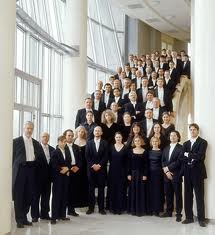|
Symphony
FROM THE NEW WORLD TO THE OLD WORLD
by Peter Lert
Saturday, June 14, 2025
Chamber
MC2 DUO RECITAL CLOSES 222'S SEASON
by Terry McNeill
Saturday, June 14, 2025
Choral and Vocal
CANTIAMO SONOMA'S LUSCIOUS A CAPELLA SINGING IN SEASON ENDING CONCERT
by Pamela Hicks Gailey
Sunday, June 8, 2025
Symphony
SRS SEASON ENDS WITH RESOUNDING TA-TA-TA-BANG
by Terry McNeill
Sunday, June 1, 2025
Symphony
YOUTHFUL VIRTUOSITY ON DISPLAY AT USO'S MAY CONCERTS
by Peter Lert
Saturday, May 17, 2025
Symphony
MYSTICAL PLANETS AND LIVELY GERSHWIN ORTIZ AT FINAL SRS CONCERT
by Peter Lert
Sunday, May 4, 2025
Symphony
VSO'S CONCERT MUSIC OF TIME, MUSIC OF PLACE
by Peter Lert
Sunday, April 27, 2025
VOCAL ELEGANCE AND FIRE AT THE 222'S RECITAL APRIL 26
by Pamela Hicks Gailey
Saturday, April 26, 2025
CANTIAMO SONOMA SINGS AN INSPIRED GOOD FRIDAY MOZART REQUIEM CONCERT
by Pamela Hicks Gailey
Friday, April 18, 2025
DRAMATIC SHOSTAKOVICH SYMPHONY CLOSES PHILHARMONIC'S 25TH SEASON
by Terry McNeill
Sunday, April 13, 2025
|
 |
 Russian National Orchestra |
CHANG AND THIBAUDET WITH A RUSSIAN TWIST
by Terry McNeill
Tuesday, July 16, 2013
It's always a formidable task for a performer to appear last on a program after wildly successful performances earlier in the concert. That unenviable job fell to violinist Sarah Chang July 16 when she played the Barber Concerto, Op. 14, with the Russian National Orchestra in Weill Hall, following a splashy St. SaŽns piano concerto and a riveting Shostakovich overture.
The Barber is ever lyrical, even in the perpetual motion finale, and throughout its 23-minute duration the bucolic nature of the work never quite gives over to extended virtuoso passages for the violin. Ms. Chang had a shaky start with intonation problems, but these were quickly resolved, and her command of the instrument's high E string notes was often thrilling. In the second movement Ms. Chang echoed Vitaly Nazarov's majestic oboe solo and widened her vibrato, the ending chord held to a lovely length by conductor Carlo Montanaro. The finale (Presto) was never a race, and Ms. Chang's flaying but accurate bow brought a rousing conclusion and loud applause.
St. SaŽns' F Major Concerto (Egyptian) has never quite gotten its due, as the composer's popular G Minor concerto (No. 2) is often performed and the tighter and more introverted C Minor (No. 4) has slipped from the repertoire. Jean-Yves Thibaudet has been on a 10-year quest to change that, playing the Egyptian Concerto all over the world and recording it several times. He now seems to own it, ripping through the showy solo part with abandon, with occasional pungent left-hand sforzandi and continual forceful attacks. In the Allegro, most of the scale passages were played very fast and with half pedal, sacrificing clarity for a colorful wash of notes. This technique suited the music, and the orchestra responded perfectly at every juncture. The Andante, with ersatz Egyptian motifs, was performed lovingly, the ending tremolo in the cellos eerie and carrying to the back of the hall.
Speed returned in the Allegro finale. Mr. Montanaro asked for, and received, tumultuous climaxes from the orchestra. Mr. Thibaudet's right-hand skips were not always accurate, but the ascending interlocking-chord cadenza near the end was controlled thunder. Mr. Montanaro reined in the orchestra with an abrupt decrescendo just before the final potent chords. Exquisite.
This sensational performance brought the audience of 1,200 to its feet. After four curtain calls, Mr. Thibaudet played a long but limpid and chaste encore, Ravel's "Pavane pour une Infante dťfunte."
With two big-name soloists, how was the Russian National Orchestra under Mr. Montanaro? Fine indeed, as they showed in the concert's beginning with the fast-paced Shostakovich Festive Overture, Op. 96. The opening brass fanfare had sharp bite, and the winds and strings played a fast four-note theme with precision. It was an impeccable performance. One wonders if the Russian National crew could play this overture in their sleep.
|
